Analysis of the Travel and Tourism Business Report: Cosmos Holidays
VerifiedAdded on 2023/01/03
|12
|4009
|84
Report
AI Summary
This report provides a detailed analysis of the travel and tourism business, using Cosmos Holidays as a case study. It begins by discussing the rationale and principles of revenue management, exploring market segmentation, optimization, overbooking control, and historical demand. It then investigates how revenue management tools like capacity utilization, discount allocation, and duration control are applied to maximize profit. The report also examines the HR lifecycle, including recruitment, training, motivation, evaluation, and celebration, and develops a performance management plan for a tour coordinator role, along with techniques to address negative behavior and staff retention. Furthermore, it explains the impact of legal issues on the travel and tourism industry, including relevant legislation, and illustrates how company, employment, and contract law influence business decision-making. Finally, the report explores different types of financial statements, reporting mechanisms, and the importance of budgeting for controlling business performance within the travel and tourism sector.
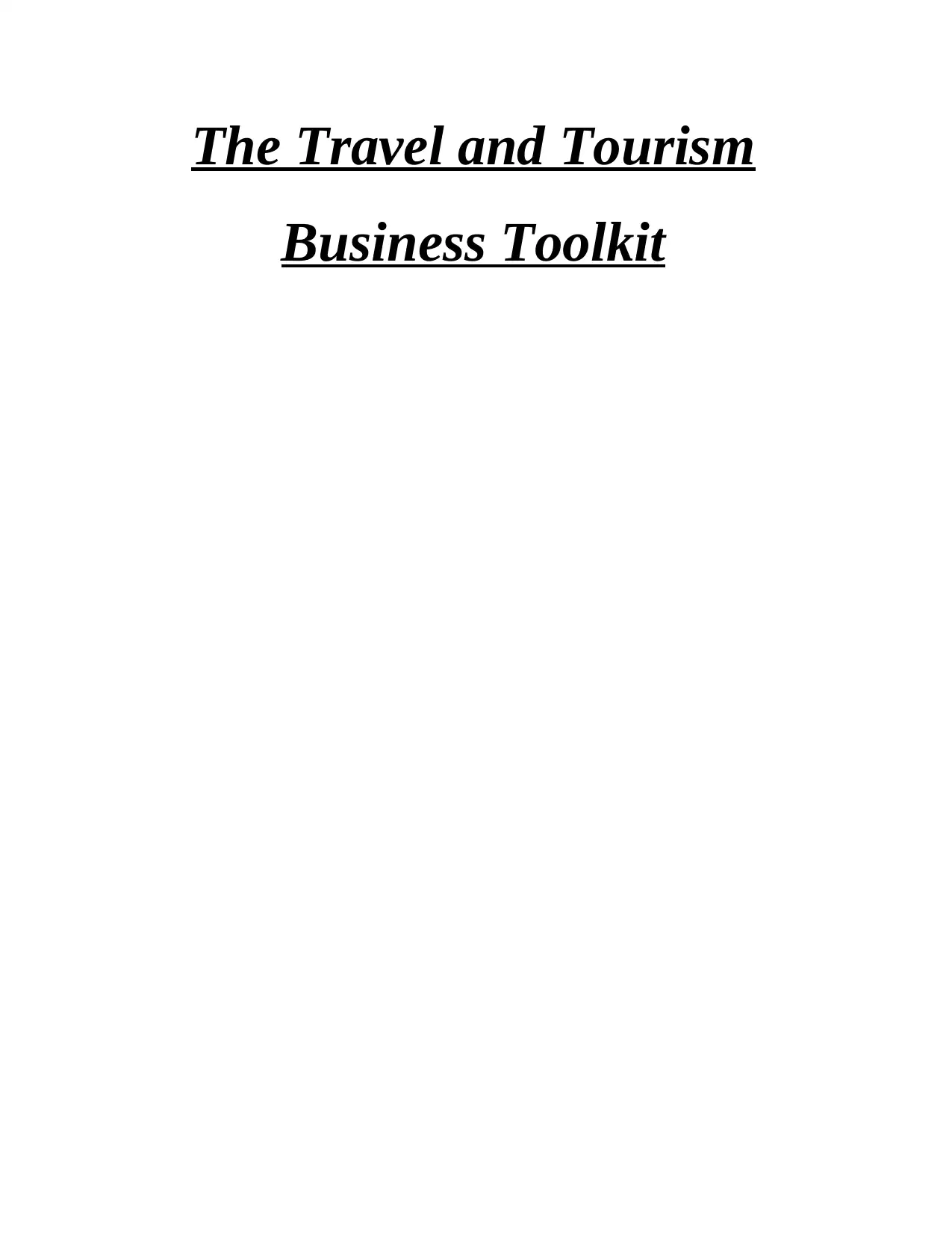
The Travel and Tourism
Business Toolkit
Business Toolkit
Paraphrase This Document
Need a fresh take? Get an instant paraphrase of this document with our AI Paraphraser
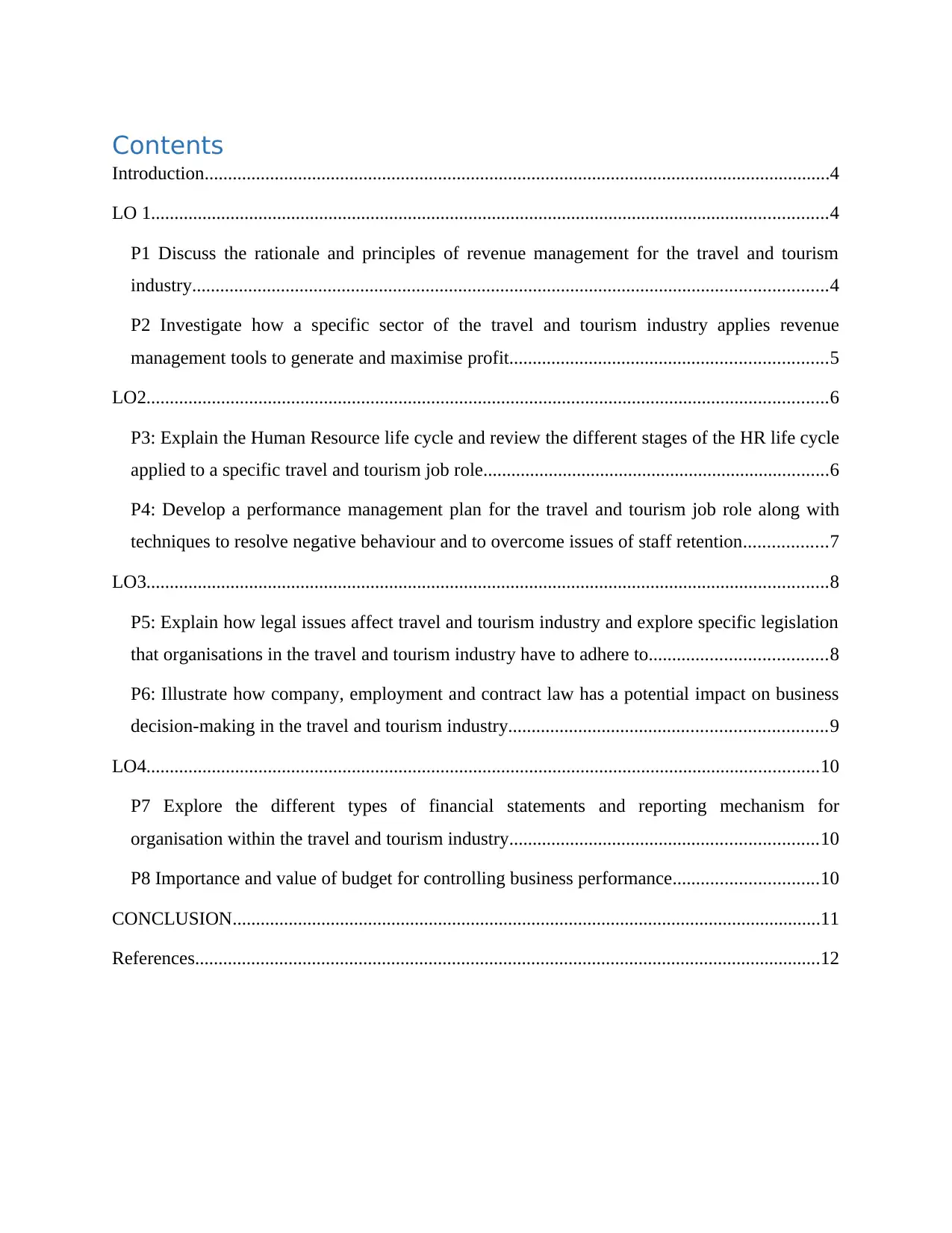
Contents
Introduction......................................................................................................................................4
LO 1.................................................................................................................................................4
P1 Discuss the rationale and principles of revenue management for the travel and tourism
industry........................................................................................................................................4
P2 Investigate how a specific sector of the travel and tourism industry applies revenue
management tools to generate and maximise profit....................................................................5
LO2..................................................................................................................................................6
P3: Explain the Human Resource life cycle and review the different stages of the HR life cycle
applied to a specific travel and tourism job role..........................................................................6
P4: Develop a performance management plan for the travel and tourism job role along with
techniques to resolve negative behaviour and to overcome issues of staff retention..................7
LO3..................................................................................................................................................8
P5: Explain how legal issues affect travel and tourism industry and explore specific legislation
that organisations in the travel and tourism industry have to adhere to......................................8
P6: Illustrate how company, employment and contract law has a potential impact on business
decision-making in the travel and tourism industry....................................................................9
LO4................................................................................................................................................10
P7 Explore the different types of financial statements and reporting mechanism for
organisation within the travel and tourism industry..................................................................10
P8 Importance and value of budget for controlling business performance...............................10
CONCLUSION..............................................................................................................................11
References......................................................................................................................................12
Introduction......................................................................................................................................4
LO 1.................................................................................................................................................4
P1 Discuss the rationale and principles of revenue management for the travel and tourism
industry........................................................................................................................................4
P2 Investigate how a specific sector of the travel and tourism industry applies revenue
management tools to generate and maximise profit....................................................................5
LO2..................................................................................................................................................6
P3: Explain the Human Resource life cycle and review the different stages of the HR life cycle
applied to a specific travel and tourism job role..........................................................................6
P4: Develop a performance management plan for the travel and tourism job role along with
techniques to resolve negative behaviour and to overcome issues of staff retention..................7
LO3..................................................................................................................................................8
P5: Explain how legal issues affect travel and tourism industry and explore specific legislation
that organisations in the travel and tourism industry have to adhere to......................................8
P6: Illustrate how company, employment and contract law has a potential impact on business
decision-making in the travel and tourism industry....................................................................9
LO4................................................................................................................................................10
P7 Explore the different types of financial statements and reporting mechanism for
organisation within the travel and tourism industry..................................................................10
P8 Importance and value of budget for controlling business performance...............................10
CONCLUSION..............................................................................................................................11
References......................................................................................................................................12
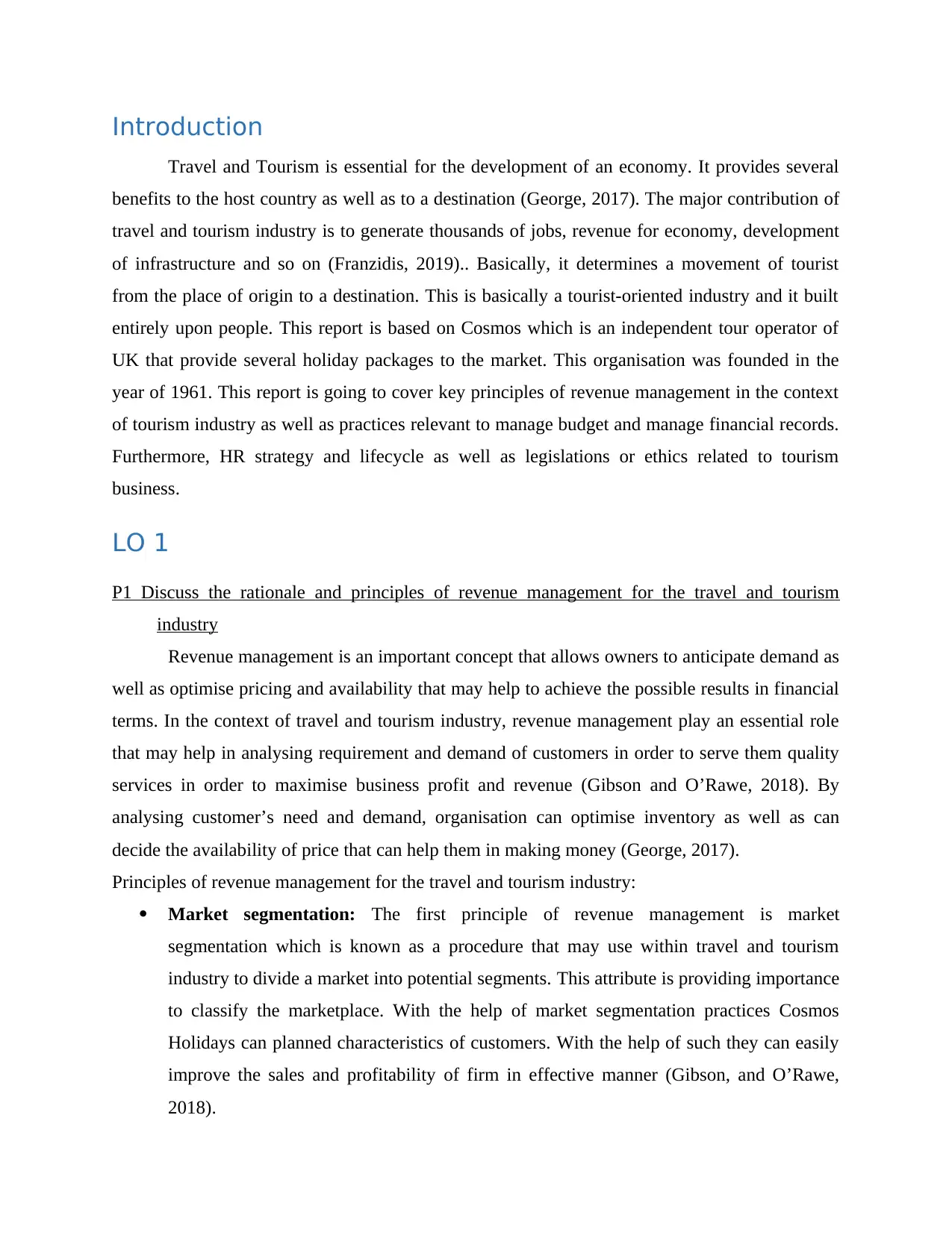
Introduction
Travel and Tourism is essential for the development of an economy. It provides several
benefits to the host country as well as to a destination (George, 2017). The major contribution of
travel and tourism industry is to generate thousands of jobs, revenue for economy, development
of infrastructure and so on (Franzidis, 2019).. Basically, it determines a movement of tourist
from the place of origin to a destination. This is basically a tourist-oriented industry and it built
entirely upon people. This report is based on Cosmos which is an independent tour operator of
UK that provide several holiday packages to the market. This organisation was founded in the
year of 1961. This report is going to cover key principles of revenue management in the context
of tourism industry as well as practices relevant to manage budget and manage financial records.
Furthermore, HR strategy and lifecycle as well as legislations or ethics related to tourism
business.
LO 1
P1 Discuss the rationale and principles of revenue management for the travel and tourism
industry
Revenue management is an important concept that allows owners to anticipate demand as
well as optimise pricing and availability that may help to achieve the possible results in financial
terms. In the context of travel and tourism industry, revenue management play an essential role
that may help in analysing requirement and demand of customers in order to serve them quality
services in order to maximise business profit and revenue (Gibson and O’Rawe, 2018). By
analysing customer’s need and demand, organisation can optimise inventory as well as can
decide the availability of price that can help them in making money (George, 2017).
Principles of revenue management for the travel and tourism industry:
Market segmentation: The first principle of revenue management is market
segmentation which is known as a procedure that may use within travel and tourism
industry to divide a market into potential segments. This attribute is providing importance
to classify the marketplace. With the help of market segmentation practices Cosmos
Holidays can planned characteristics of customers. With the help of such they can easily
improve the sales and profitability of firm in effective manner (Gibson, and O’Rawe,
2018).
Travel and Tourism is essential for the development of an economy. It provides several
benefits to the host country as well as to a destination (George, 2017). The major contribution of
travel and tourism industry is to generate thousands of jobs, revenue for economy, development
of infrastructure and so on (Franzidis, 2019).. Basically, it determines a movement of tourist
from the place of origin to a destination. This is basically a tourist-oriented industry and it built
entirely upon people. This report is based on Cosmos which is an independent tour operator of
UK that provide several holiday packages to the market. This organisation was founded in the
year of 1961. This report is going to cover key principles of revenue management in the context
of tourism industry as well as practices relevant to manage budget and manage financial records.
Furthermore, HR strategy and lifecycle as well as legislations or ethics related to tourism
business.
LO 1
P1 Discuss the rationale and principles of revenue management for the travel and tourism
industry
Revenue management is an important concept that allows owners to anticipate demand as
well as optimise pricing and availability that may help to achieve the possible results in financial
terms. In the context of travel and tourism industry, revenue management play an essential role
that may help in analysing requirement and demand of customers in order to serve them quality
services in order to maximise business profit and revenue (Gibson and O’Rawe, 2018). By
analysing customer’s need and demand, organisation can optimise inventory as well as can
decide the availability of price that can help them in making money (George, 2017).
Principles of revenue management for the travel and tourism industry:
Market segmentation: The first principle of revenue management is market
segmentation which is known as a procedure that may use within travel and tourism
industry to divide a market into potential segments. This attribute is providing importance
to classify the marketplace. With the help of market segmentation practices Cosmos
Holidays can planned characteristics of customers. With the help of such they can easily
improve the sales and profitability of firm in effective manner (Gibson, and O’Rawe,
2018).
⊘ This is a preview!⊘
Do you want full access?
Subscribe today to unlock all pages.

Trusted by 1+ million students worldwide
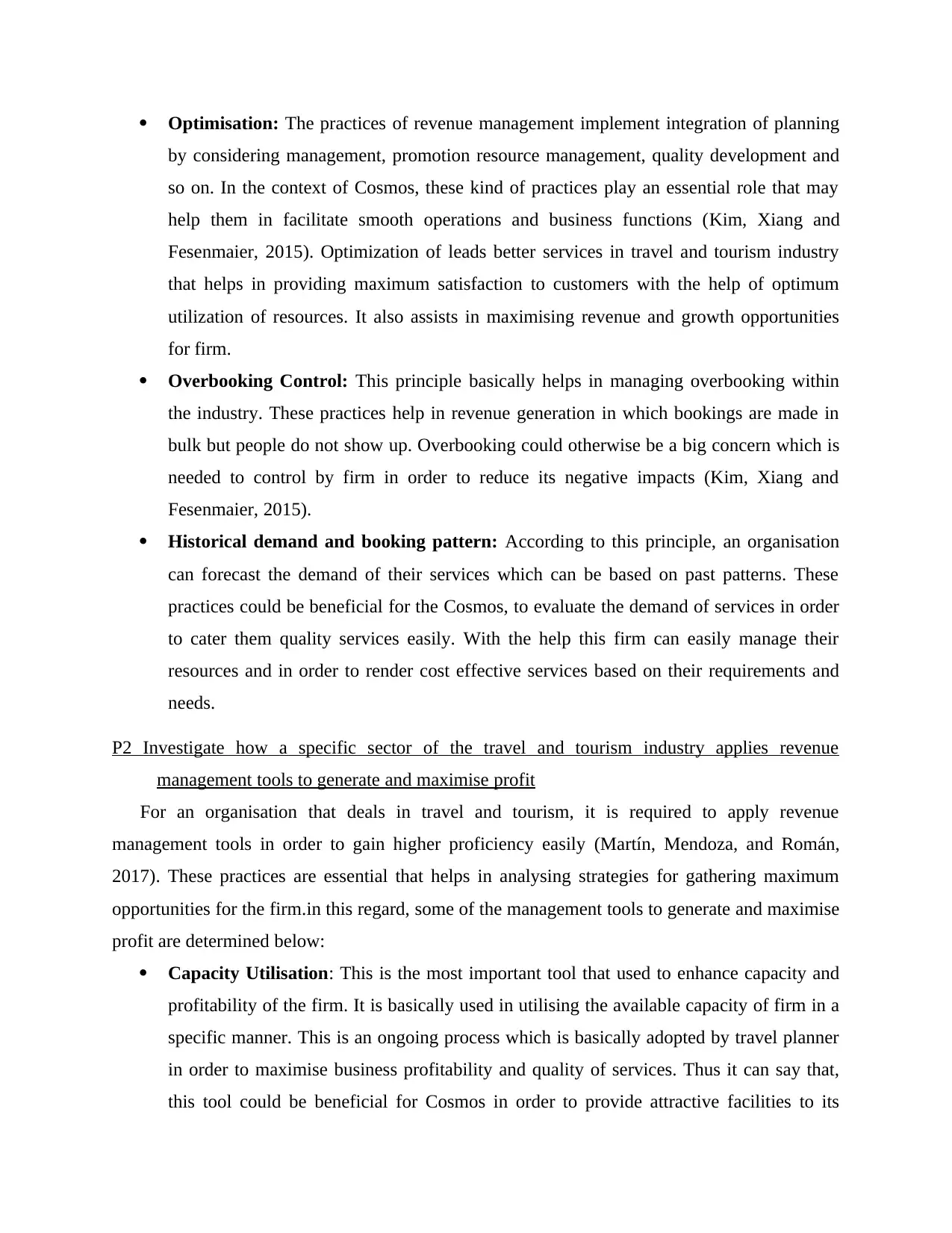
Optimisation: The practices of revenue management implement integration of planning
by considering management, promotion resource management, quality development and
so on. In the context of Cosmos, these kind of practices play an essential role that may
help them in facilitate smooth operations and business functions (Kim, Xiang and
Fesenmaier, 2015). Optimization of leads better services in travel and tourism industry
that helps in providing maximum satisfaction to customers with the help of optimum
utilization of resources. It also assists in maximising revenue and growth opportunities
for firm.
Overbooking Control: This principle basically helps in managing overbooking within
the industry. These practices help in revenue generation in which bookings are made in
bulk but people do not show up. Overbooking could otherwise be a big concern which is
needed to control by firm in order to reduce its negative impacts (Kim, Xiang and
Fesenmaier, 2015).
Historical demand and booking pattern: According to this principle, an organisation
can forecast the demand of their services which can be based on past patterns. These
practices could be beneficial for the Cosmos, to evaluate the demand of services in order
to cater them quality services easily. With the help this firm can easily manage their
resources and in order to render cost effective services based on their requirements and
needs.
P2 Investigate how a specific sector of the travel and tourism industry applies revenue
management tools to generate and maximise profit
For an organisation that deals in travel and tourism, it is required to apply revenue
management tools in order to gain higher proficiency easily (Martín, Mendoza, and Román,
2017). These practices are essential that helps in analysing strategies for gathering maximum
opportunities for the firm.in this regard, some of the management tools to generate and maximise
profit are determined below:
Capacity Utilisation: This is the most important tool that used to enhance capacity and
profitability of the firm. It is basically used in utilising the available capacity of firm in a
specific manner. This is an ongoing process which is basically adopted by travel planner
in order to maximise business profitability and quality of services. Thus it can say that,
this tool could be beneficial for Cosmos in order to provide attractive facilities to its
by considering management, promotion resource management, quality development and
so on. In the context of Cosmos, these kind of practices play an essential role that may
help them in facilitate smooth operations and business functions (Kim, Xiang and
Fesenmaier, 2015). Optimization of leads better services in travel and tourism industry
that helps in providing maximum satisfaction to customers with the help of optimum
utilization of resources. It also assists in maximising revenue and growth opportunities
for firm.
Overbooking Control: This principle basically helps in managing overbooking within
the industry. These practices help in revenue generation in which bookings are made in
bulk but people do not show up. Overbooking could otherwise be a big concern which is
needed to control by firm in order to reduce its negative impacts (Kim, Xiang and
Fesenmaier, 2015).
Historical demand and booking pattern: According to this principle, an organisation
can forecast the demand of their services which can be based on past patterns. These
practices could be beneficial for the Cosmos, to evaluate the demand of services in order
to cater them quality services easily. With the help this firm can easily manage their
resources and in order to render cost effective services based on their requirements and
needs.
P2 Investigate how a specific sector of the travel and tourism industry applies revenue
management tools to generate and maximise profit
For an organisation that deals in travel and tourism, it is required to apply revenue
management tools in order to gain higher proficiency easily (Martín, Mendoza, and Román,
2017). These practices are essential that helps in analysing strategies for gathering maximum
opportunities for the firm.in this regard, some of the management tools to generate and maximise
profit are determined below:
Capacity Utilisation: This is the most important tool that used to enhance capacity and
profitability of the firm. It is basically used in utilising the available capacity of firm in a
specific manner. This is an ongoing process which is basically adopted by travel planner
in order to maximise business profitability and quality of services. Thus it can say that,
this tool could be beneficial for Cosmos in order to provide attractive facilities to its
Paraphrase This Document
Need a fresh take? Get an instant paraphrase of this document with our AI Paraphraser
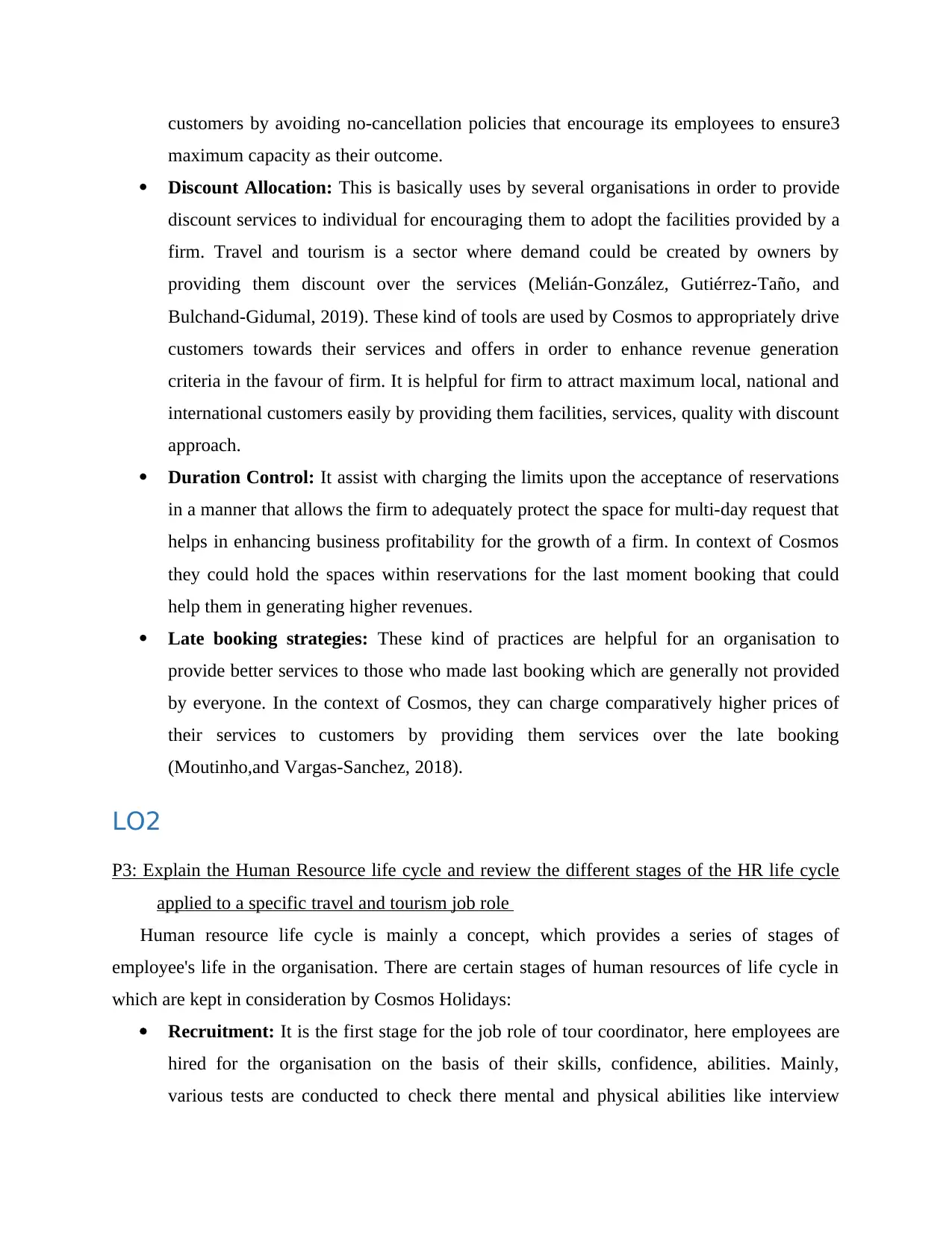
customers by avoiding no-cancellation policies that encourage its employees to ensure3
maximum capacity as their outcome.
Discount Allocation: This is basically uses by several organisations in order to provide
discount services to individual for encouraging them to adopt the facilities provided by a
firm. Travel and tourism is a sector where demand could be created by owners by
providing them discount over the services (Melián-González, Gutiérrez-Taño, and
Bulchand-Gidumal, 2019). These kind of tools are used by Cosmos to appropriately drive
customers towards their services and offers in order to enhance revenue generation
criteria in the favour of firm. It is helpful for firm to attract maximum local, national and
international customers easily by providing them facilities, services, quality with discount
approach.
Duration Control: It assist with charging the limits upon the acceptance of reservations
in a manner that allows the firm to adequately protect the space for multi-day request that
helps in enhancing business profitability for the growth of a firm. In context of Cosmos
they could hold the spaces within reservations for the last moment booking that could
help them in generating higher revenues.
Late booking strategies: These kind of practices are helpful for an organisation to
provide better services to those who made last booking which are generally not provided
by everyone. In the context of Cosmos, they can charge comparatively higher prices of
their services to customers by providing them services over the late booking
(Moutinho,and Vargas-Sanchez, 2018).
LO2
P3: Explain the Human Resource life cycle and review the different stages of the HR life cycle
applied to a specific travel and tourism job role
Human resource life cycle is mainly a concept, which provides a series of stages of
employee's life in the organisation. There are certain stages of human resources of life cycle in
which are kept in consideration by Cosmos Holidays:
Recruitment: It is the first stage for the job role of tour coordinator, here employees are
hired for the organisation on the basis of their skills, confidence, abilities. Mainly,
various tests are conducted to check there mental and physical abilities like interview
maximum capacity as their outcome.
Discount Allocation: This is basically uses by several organisations in order to provide
discount services to individual for encouraging them to adopt the facilities provided by a
firm. Travel and tourism is a sector where demand could be created by owners by
providing them discount over the services (Melián-González, Gutiérrez-Taño, and
Bulchand-Gidumal, 2019). These kind of tools are used by Cosmos to appropriately drive
customers towards their services and offers in order to enhance revenue generation
criteria in the favour of firm. It is helpful for firm to attract maximum local, national and
international customers easily by providing them facilities, services, quality with discount
approach.
Duration Control: It assist with charging the limits upon the acceptance of reservations
in a manner that allows the firm to adequately protect the space for multi-day request that
helps in enhancing business profitability for the growth of a firm. In context of Cosmos
they could hold the spaces within reservations for the last moment booking that could
help them in generating higher revenues.
Late booking strategies: These kind of practices are helpful for an organisation to
provide better services to those who made last booking which are generally not provided
by everyone. In the context of Cosmos, they can charge comparatively higher prices of
their services to customers by providing them services over the late booking
(Moutinho,and Vargas-Sanchez, 2018).
LO2
P3: Explain the Human Resource life cycle and review the different stages of the HR life cycle
applied to a specific travel and tourism job role
Human resource life cycle is mainly a concept, which provides a series of stages of
employee's life in the organisation. There are certain stages of human resources of life cycle in
which are kept in consideration by Cosmos Holidays:
Recruitment: It is the first stage for the job role of tour coordinator, here employees are
hired for the organisation on the basis of their skills, confidence, abilities. Mainly,
various tests are conducted to check there mental and physical abilities like interview
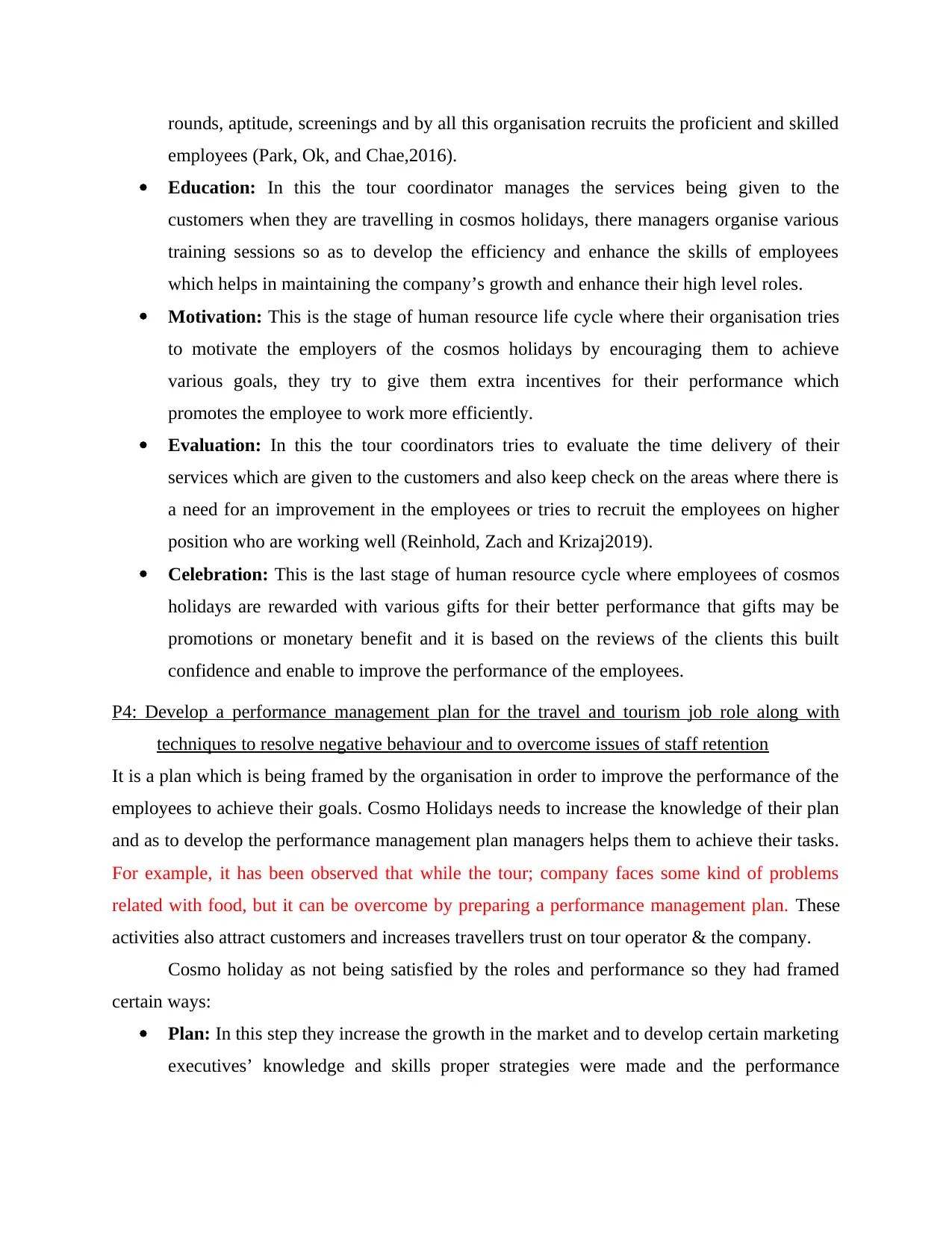
rounds, aptitude, screenings and by all this organisation recruits the proficient and skilled
employees (Park, Ok, and Chae,2016).
Education: In this the tour coordinator manages the services being given to the
customers when they are travelling in cosmos holidays, there managers organise various
training sessions so as to develop the efficiency and enhance the skills of employees
which helps in maintaining the company’s growth and enhance their high level roles.
Motivation: This is the stage of human resource life cycle where their organisation tries
to motivate the employers of the cosmos holidays by encouraging them to achieve
various goals, they try to give them extra incentives for their performance which
promotes the employee to work more efficiently.
Evaluation: In this the tour coordinators tries to evaluate the time delivery of their
services which are given to the customers and also keep check on the areas where there is
a need for an improvement in the employees or tries to recruit the employees on higher
position who are working well (Reinhold, Zach and Krizaj2019).
Celebration: This is the last stage of human resource cycle where employees of cosmos
holidays are rewarded with various gifts for their better performance that gifts may be
promotions or monetary benefit and it is based on the reviews of the clients this built
confidence and enable to improve the performance of the employees.
P4: Develop a performance management plan for the travel and tourism job role along with
techniques to resolve negative behaviour and to overcome issues of staff retention
It is a plan which is being framed by the organisation in order to improve the performance of the
employees to achieve their goals. Cosmo Holidays needs to increase the knowledge of their plan
and as to develop the performance management plan managers helps them to achieve their tasks.
For example, it has been observed that while the tour; company faces some kind of problems
related with food, but it can be overcome by preparing a performance management plan. These
activities also attract customers and increases travellers trust on tour operator & the company.
Cosmo holiday as not being satisfied by the roles and performance so they had framed
certain ways:
Plan: In this step they increase the growth in the market and to develop certain marketing
executives’ knowledge and skills proper strategies were made and the performance
employees (Park, Ok, and Chae,2016).
Education: In this the tour coordinator manages the services being given to the
customers when they are travelling in cosmos holidays, there managers organise various
training sessions so as to develop the efficiency and enhance the skills of employees
which helps in maintaining the company’s growth and enhance their high level roles.
Motivation: This is the stage of human resource life cycle where their organisation tries
to motivate the employers of the cosmos holidays by encouraging them to achieve
various goals, they try to give them extra incentives for their performance which
promotes the employee to work more efficiently.
Evaluation: In this the tour coordinators tries to evaluate the time delivery of their
services which are given to the customers and also keep check on the areas where there is
a need for an improvement in the employees or tries to recruit the employees on higher
position who are working well (Reinhold, Zach and Krizaj2019).
Celebration: This is the last stage of human resource cycle where employees of cosmos
holidays are rewarded with various gifts for their better performance that gifts may be
promotions or monetary benefit and it is based on the reviews of the clients this built
confidence and enable to improve the performance of the employees.
P4: Develop a performance management plan for the travel and tourism job role along with
techniques to resolve negative behaviour and to overcome issues of staff retention
It is a plan which is being framed by the organisation in order to improve the performance of the
employees to achieve their goals. Cosmo Holidays needs to increase the knowledge of their plan
and as to develop the performance management plan managers helps them to achieve their tasks.
For example, it has been observed that while the tour; company faces some kind of problems
related with food, but it can be overcome by preparing a performance management plan. These
activities also attract customers and increases travellers trust on tour operator & the company.
Cosmo holiday as not being satisfied by the roles and performance so they had framed
certain ways:
Plan: In this step they increase the growth in the market and to develop certain marketing
executives’ knowledge and skills proper strategies were made and the performance
⊘ This is a preview!⊘
Do you want full access?
Subscribe today to unlock all pages.

Trusted by 1+ million students worldwide
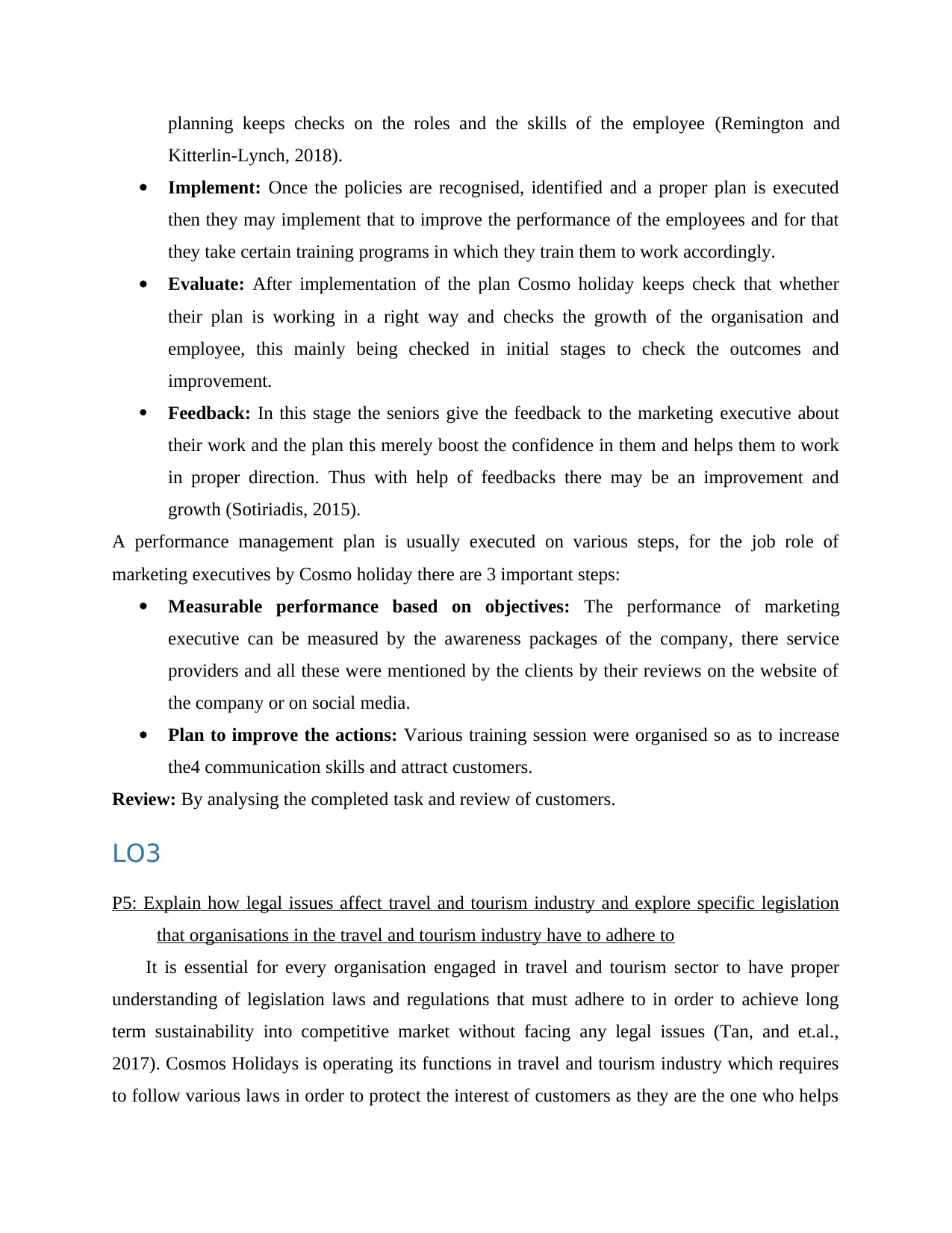
planning keeps checks on the roles and the skills of the employee (Remington and
Kitterlin-Lynch, 2018).
Implement: Once the policies are recognised, identified and a proper plan is executed
then they may implement that to improve the performance of the employees and for that
they take certain training programs in which they train them to work accordingly.
Evaluate: After implementation of the plan Cosmo holiday keeps check that whether
their plan is working in a right way and checks the growth of the organisation and
employee, this mainly being checked in initial stages to check the outcomes and
improvement.
Feedback: In this stage the seniors give the feedback to the marketing executive about
their work and the plan this merely boost the confidence in them and helps them to work
in proper direction. Thus with help of feedbacks there may be an improvement and
growth (Sotiriadis, 2015).
A performance management plan is usually executed on various steps, for the job role of
marketing executives by Cosmo holiday there are 3 important steps:
Measurable performance based on objectives: The performance of marketing
executive can be measured by the awareness packages of the company, there service
providers and all these were mentioned by the clients by their reviews on the website of
the company or on social media.
Plan to improve the actions: Various training session were organised so as to increase
the4 communication skills and attract customers.
Review: By analysing the completed task and review of customers.
LO3
P5: Explain how legal issues affect travel and tourism industry and explore specific legislation
that organisations in the travel and tourism industry have to adhere to
It is essential for every organisation engaged in travel and tourism sector to have proper
understanding of legislation laws and regulations that must adhere to in order to achieve long
term sustainability into competitive market without facing any legal issues (Tan, and et.al.,
2017). Cosmos Holidays is operating its functions in travel and tourism industry which requires
to follow various laws in order to protect the interest of customers as they are the one who helps
Kitterlin-Lynch, 2018).
Implement: Once the policies are recognised, identified and a proper plan is executed
then they may implement that to improve the performance of the employees and for that
they take certain training programs in which they train them to work accordingly.
Evaluate: After implementation of the plan Cosmo holiday keeps check that whether
their plan is working in a right way and checks the growth of the organisation and
employee, this mainly being checked in initial stages to check the outcomes and
improvement.
Feedback: In this stage the seniors give the feedback to the marketing executive about
their work and the plan this merely boost the confidence in them and helps them to work
in proper direction. Thus with help of feedbacks there may be an improvement and
growth (Sotiriadis, 2015).
A performance management plan is usually executed on various steps, for the job role of
marketing executives by Cosmo holiday there are 3 important steps:
Measurable performance based on objectives: The performance of marketing
executive can be measured by the awareness packages of the company, there service
providers and all these were mentioned by the clients by their reviews on the website of
the company or on social media.
Plan to improve the actions: Various training session were organised so as to increase
the4 communication skills and attract customers.
Review: By analysing the completed task and review of customers.
LO3
P5: Explain how legal issues affect travel and tourism industry and explore specific legislation
that organisations in the travel and tourism industry have to adhere to
It is essential for every organisation engaged in travel and tourism sector to have proper
understanding of legislation laws and regulations that must adhere to in order to achieve long
term sustainability into competitive market without facing any legal issues (Tan, and et.al.,
2017). Cosmos Holidays is operating its functions in travel and tourism industry which requires
to follow various laws in order to protect the interest of customers as they are the one who helps
Paraphrase This Document
Need a fresh take? Get an instant paraphrase of this document with our AI Paraphraser
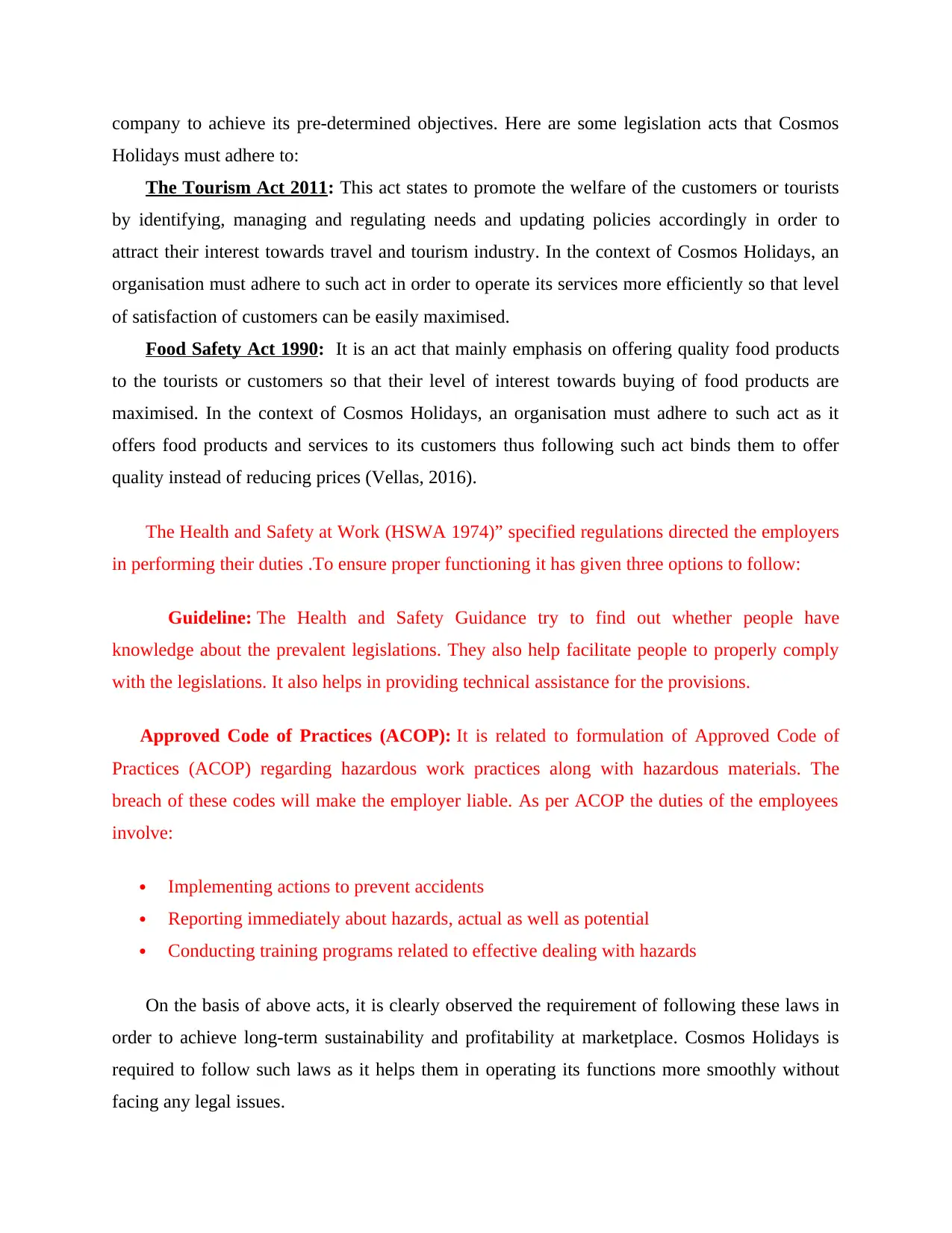
company to achieve its pre-determined objectives. Here are some legislation acts that Cosmos
Holidays must adhere to:
The Tourism Act 2011: This act states to promote the welfare of the customers or tourists
by identifying, managing and regulating needs and updating policies accordingly in order to
attract their interest towards travel and tourism industry. In the context of Cosmos Holidays, an
organisation must adhere to such act in order to operate its services more efficiently so that level
of satisfaction of customers can be easily maximised.
Food Safety Act 1990: It is an act that mainly emphasis on offering quality food products
to the tourists or customers so that their level of interest towards buying of food products are
maximised. In the context of Cosmos Holidays, an organisation must adhere to such act as it
offers food products and services to its customers thus following such act binds them to offer
quality instead of reducing prices (Vellas, 2016).
The Health and Safety at Work (HSWA 1974)” specified regulations directed the employers
in performing their duties .To ensure proper functioning it has given three options to follow:
Guideline: The Health and Safety Guidance try to find out whether people have
knowledge about the prevalent legislations. They also help facilitate people to properly comply
with the legislations. It also helps in providing technical assistance for the provisions.
Approved Code of Practices (ACOP): It is related to formulation of Approved Code of
Practices (ACOP) regarding hazardous work practices along with hazardous materials. The
breach of these codes will make the employer liable. As per ACOP the duties of the employees
involve:
Implementing actions to prevent accidents
Reporting immediately about hazards, actual as well as potential
Conducting training programs related to effective dealing with hazards
On the basis of above acts, it is clearly observed the requirement of following these laws in
order to achieve long-term sustainability and profitability at marketplace. Cosmos Holidays is
required to follow such laws as it helps them in operating its functions more smoothly without
facing any legal issues.
Holidays must adhere to:
The Tourism Act 2011: This act states to promote the welfare of the customers or tourists
by identifying, managing and regulating needs and updating policies accordingly in order to
attract their interest towards travel and tourism industry. In the context of Cosmos Holidays, an
organisation must adhere to such act in order to operate its services more efficiently so that level
of satisfaction of customers can be easily maximised.
Food Safety Act 1990: It is an act that mainly emphasis on offering quality food products
to the tourists or customers so that their level of interest towards buying of food products are
maximised. In the context of Cosmos Holidays, an organisation must adhere to such act as it
offers food products and services to its customers thus following such act binds them to offer
quality instead of reducing prices (Vellas, 2016).
The Health and Safety at Work (HSWA 1974)” specified regulations directed the employers
in performing their duties .To ensure proper functioning it has given three options to follow:
Guideline: The Health and Safety Guidance try to find out whether people have
knowledge about the prevalent legislations. They also help facilitate people to properly comply
with the legislations. It also helps in providing technical assistance for the provisions.
Approved Code of Practices (ACOP): It is related to formulation of Approved Code of
Practices (ACOP) regarding hazardous work practices along with hazardous materials. The
breach of these codes will make the employer liable. As per ACOP the duties of the employees
involve:
Implementing actions to prevent accidents
Reporting immediately about hazards, actual as well as potential
Conducting training programs related to effective dealing with hazards
On the basis of above acts, it is clearly observed the requirement of following these laws in
order to achieve long-term sustainability and profitability at marketplace. Cosmos Holidays is
required to follow such laws as it helps them in operating its functions more smoothly without
facing any legal issues.
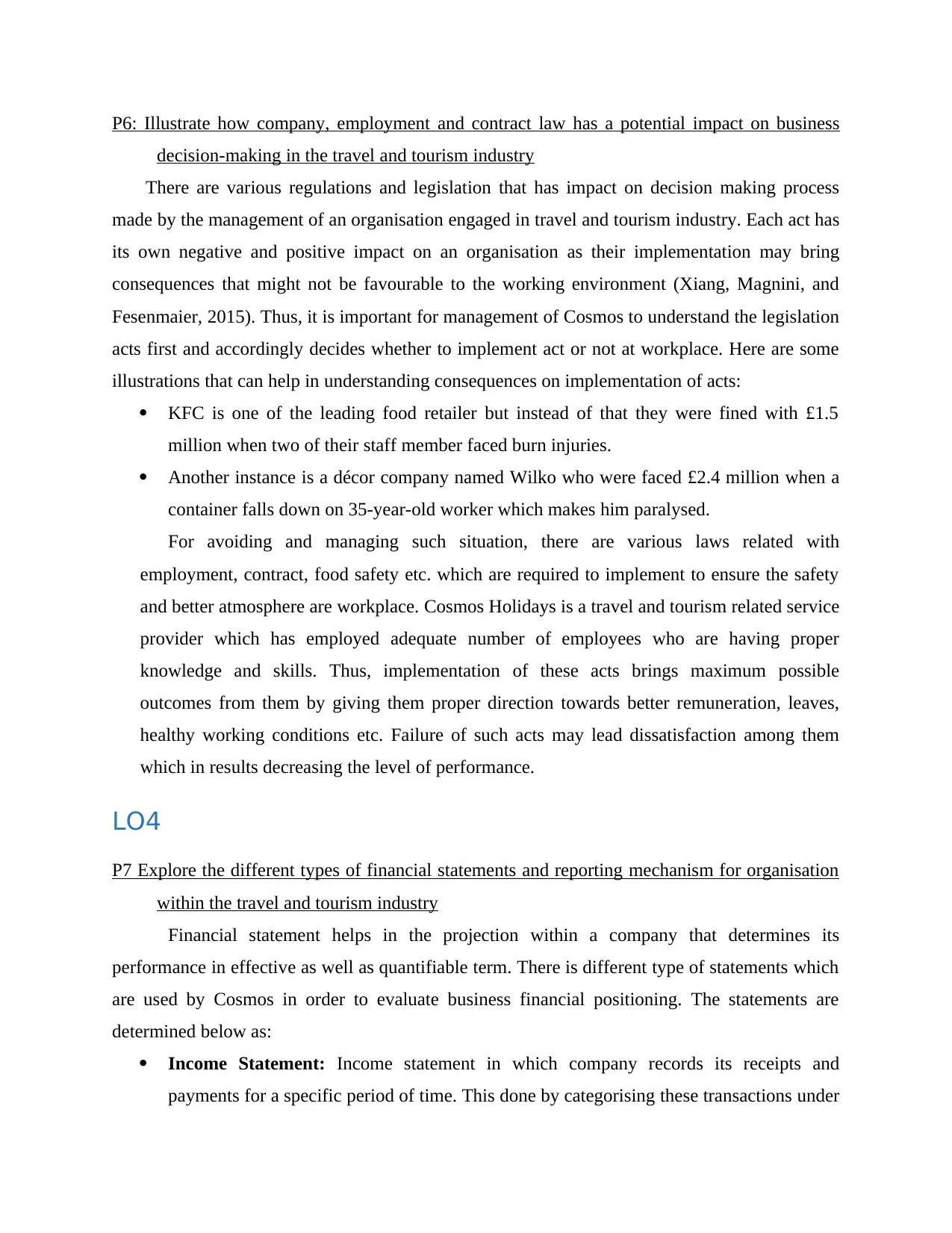
P6: Illustrate how company, employment and contract law has a potential impact on business
decision-making in the travel and tourism industry
There are various regulations and legislation that has impact on decision making process
made by the management of an organisation engaged in travel and tourism industry. Each act has
its own negative and positive impact on an organisation as their implementation may bring
consequences that might not be favourable to the working environment (Xiang, Magnini, and
Fesenmaier, 2015). Thus, it is important for management of Cosmos to understand the legislation
acts first and accordingly decides whether to implement act or not at workplace. Here are some
illustrations that can help in understanding consequences on implementation of acts:
KFC is one of the leading food retailer but instead of that they were fined with £1.5
million when two of their staff member faced burn injuries.
Another instance is a décor company named Wilko who were faced £2.4 million when a
container falls down on 35-year-old worker which makes him paralysed.
For avoiding and managing such situation, there are various laws related with
employment, contract, food safety etc. which are required to implement to ensure the safety
and better atmosphere are workplace. Cosmos Holidays is a travel and tourism related service
provider which has employed adequate number of employees who are having proper
knowledge and skills. Thus, implementation of these acts brings maximum possible
outcomes from them by giving them proper direction towards better remuneration, leaves,
healthy working conditions etc. Failure of such acts may lead dissatisfaction among them
which in results decreasing the level of performance.
LO4
P7 Explore the different types of financial statements and reporting mechanism for organisation
within the travel and tourism industry
Financial statement helps in the projection within a company that determines its
performance in effective as well as quantifiable term. There is different type of statements which
are used by Cosmos in order to evaluate business financial positioning. The statements are
determined below as:
Income Statement: Income statement in which company records its receipts and
payments for a specific period of time. This done by categorising these transactions under
decision-making in the travel and tourism industry
There are various regulations and legislation that has impact on decision making process
made by the management of an organisation engaged in travel and tourism industry. Each act has
its own negative and positive impact on an organisation as their implementation may bring
consequences that might not be favourable to the working environment (Xiang, Magnini, and
Fesenmaier, 2015). Thus, it is important for management of Cosmos to understand the legislation
acts first and accordingly decides whether to implement act or not at workplace. Here are some
illustrations that can help in understanding consequences on implementation of acts:
KFC is one of the leading food retailer but instead of that they were fined with £1.5
million when two of their staff member faced burn injuries.
Another instance is a décor company named Wilko who were faced £2.4 million when a
container falls down on 35-year-old worker which makes him paralysed.
For avoiding and managing such situation, there are various laws related with
employment, contract, food safety etc. which are required to implement to ensure the safety
and better atmosphere are workplace. Cosmos Holidays is a travel and tourism related service
provider which has employed adequate number of employees who are having proper
knowledge and skills. Thus, implementation of these acts brings maximum possible
outcomes from them by giving them proper direction towards better remuneration, leaves,
healthy working conditions etc. Failure of such acts may lead dissatisfaction among them
which in results decreasing the level of performance.
LO4
P7 Explore the different types of financial statements and reporting mechanism for organisation
within the travel and tourism industry
Financial statement helps in the projection within a company that determines its
performance in effective as well as quantifiable term. There is different type of statements which
are used by Cosmos in order to evaluate business financial positioning. The statements are
determined below as:
Income Statement: Income statement in which company records its receipts and
payments for a specific period of time. This done by categorising these transactions under
⊘ This is a preview!⊘
Do you want full access?
Subscribe today to unlock all pages.

Trusted by 1+ million students worldwide
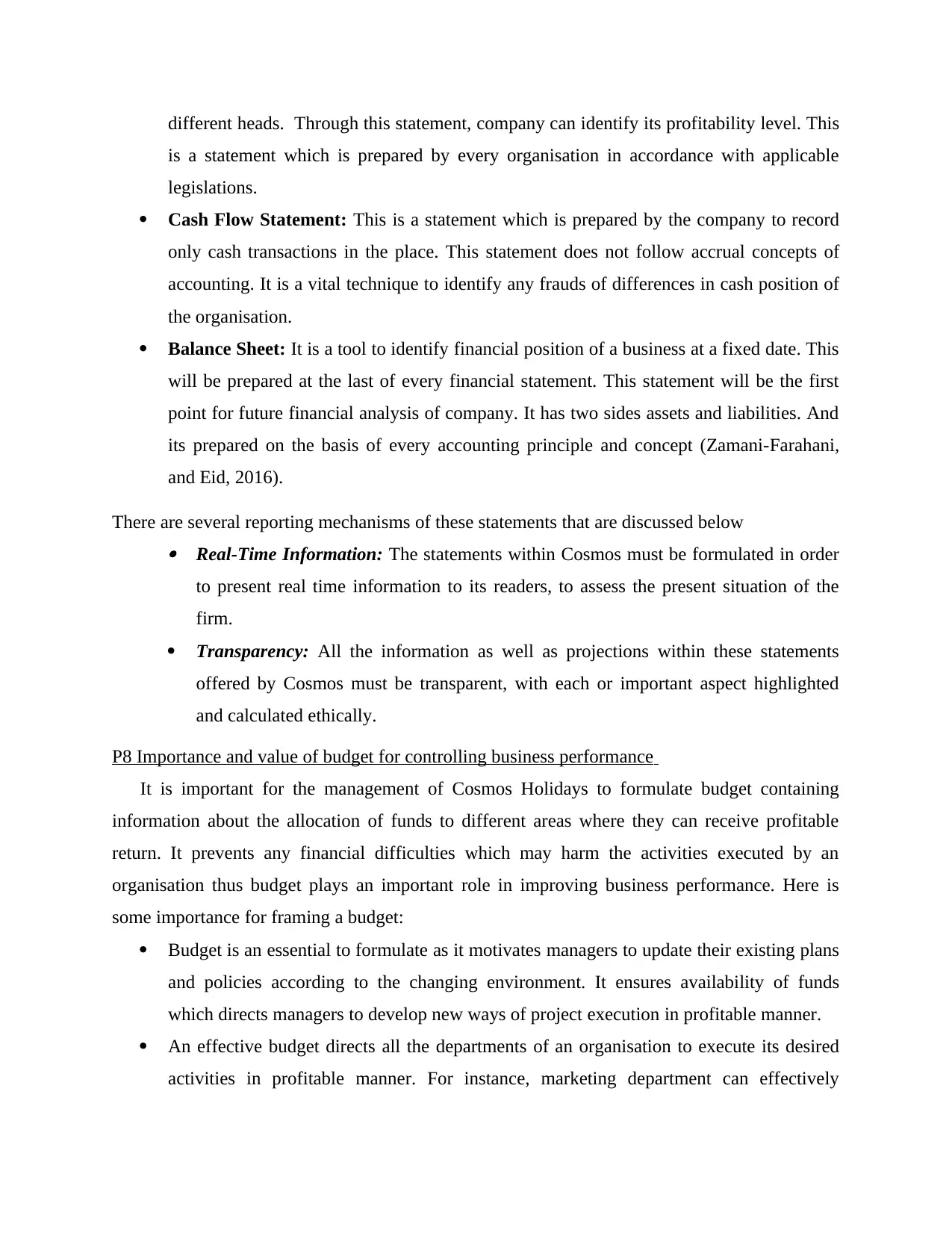
different heads. Through this statement, company can identify its profitability level. This
is a statement which is prepared by every organisation in accordance with applicable
legislations.
Cash Flow Statement: This is a statement which is prepared by the company to record
only cash transactions in the place. This statement does not follow accrual concepts of
accounting. It is a vital technique to identify any frauds of differences in cash position of
the organisation.
Balance Sheet: It is a tool to identify financial position of a business at a fixed date. This
will be prepared at the last of every financial statement. This statement will be the first
point for future financial analysis of company. It has two sides assets and liabilities. And
its prepared on the basis of every accounting principle and concept (Zamani-Farahani,
and Eid, 2016).
There are several reporting mechanisms of these statements that are discussed below
Real-Time Information: The statements within Cosmos must be formulated in order
to present real time information to its readers, to assess the present situation of the
firm.
Transparency: All the information as well as projections within these statements
offered by Cosmos must be transparent, with each or important aspect highlighted
and calculated ethically.
P8 Importance and value of budget for controlling business performance
It is important for the management of Cosmos Holidays to formulate budget containing
information about the allocation of funds to different areas where they can receive profitable
return. It prevents any financial difficulties which may harm the activities executed by an
organisation thus budget plays an important role in improving business performance. Here is
some importance for framing a budget:
Budget is an essential to formulate as it motivates managers to update their existing plans
and policies according to the changing environment. It ensures availability of funds
which directs managers to develop new ways of project execution in profitable manner.
An effective budget directs all the departments of an organisation to execute its desired
activities in profitable manner. For instance, marketing department can effectively
is a statement which is prepared by every organisation in accordance with applicable
legislations.
Cash Flow Statement: This is a statement which is prepared by the company to record
only cash transactions in the place. This statement does not follow accrual concepts of
accounting. It is a vital technique to identify any frauds of differences in cash position of
the organisation.
Balance Sheet: It is a tool to identify financial position of a business at a fixed date. This
will be prepared at the last of every financial statement. This statement will be the first
point for future financial analysis of company. It has two sides assets and liabilities. And
its prepared on the basis of every accounting principle and concept (Zamani-Farahani,
and Eid, 2016).
There are several reporting mechanisms of these statements that are discussed below
Real-Time Information: The statements within Cosmos must be formulated in order
to present real time information to its readers, to assess the present situation of the
firm.
Transparency: All the information as well as projections within these statements
offered by Cosmos must be transparent, with each or important aspect highlighted
and calculated ethically.
P8 Importance and value of budget for controlling business performance
It is important for the management of Cosmos Holidays to formulate budget containing
information about the allocation of funds to different areas where they can receive profitable
return. It prevents any financial difficulties which may harm the activities executed by an
organisation thus budget plays an important role in improving business performance. Here is
some importance for framing a budget:
Budget is an essential to formulate as it motivates managers to update their existing plans
and policies according to the changing environment. It ensures availability of funds
which directs managers to develop new ways of project execution in profitable manner.
An effective budget directs all the departments of an organisation to execute its desired
activities in profitable manner. For instance, marketing department can effectively
Paraphrase This Document
Need a fresh take? Get an instant paraphrase of this document with our AI Paraphraser
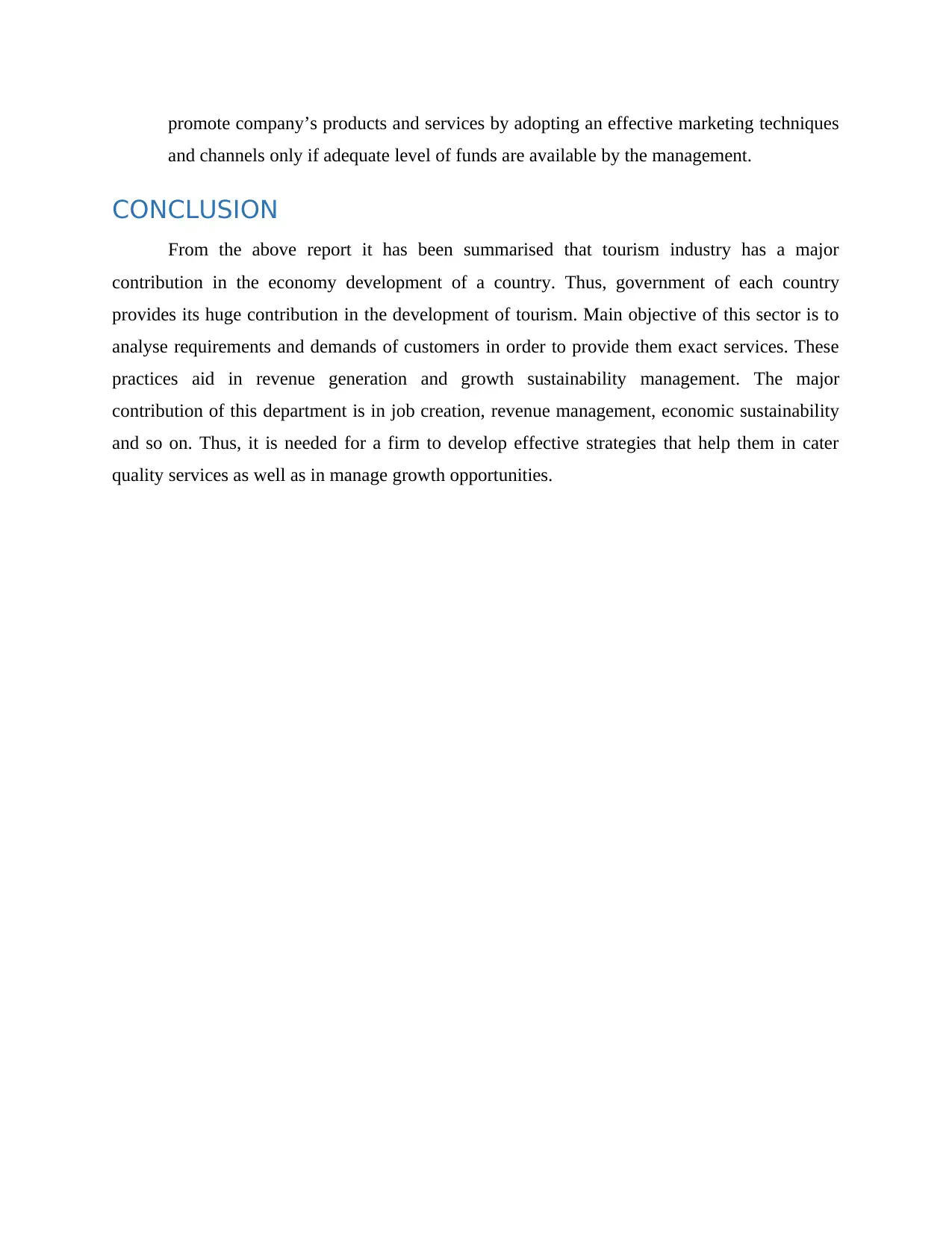
promote company’s products and services by adopting an effective marketing techniques
and channels only if adequate level of funds are available by the management.
CONCLUSION
From the above report it has been summarised that tourism industry has a major
contribution in the economy development of a country. Thus, government of each country
provides its huge contribution in the development of tourism. Main objective of this sector is to
analyse requirements and demands of customers in order to provide them exact services. These
practices aid in revenue generation and growth sustainability management. The major
contribution of this department is in job creation, revenue management, economic sustainability
and so on. Thus, it is needed for a firm to develop effective strategies that help them in cater
quality services as well as in manage growth opportunities.
and channels only if adequate level of funds are available by the management.
CONCLUSION
From the above report it has been summarised that tourism industry has a major
contribution in the economy development of a country. Thus, government of each country
provides its huge contribution in the development of tourism. Main objective of this sector is to
analyse requirements and demands of customers in order to provide them exact services. These
practices aid in revenue generation and growth sustainability management. The major
contribution of this department is in job creation, revenue management, economic sustainability
and so on. Thus, it is needed for a firm to develop effective strategies that help them in cater
quality services as well as in manage growth opportunities.
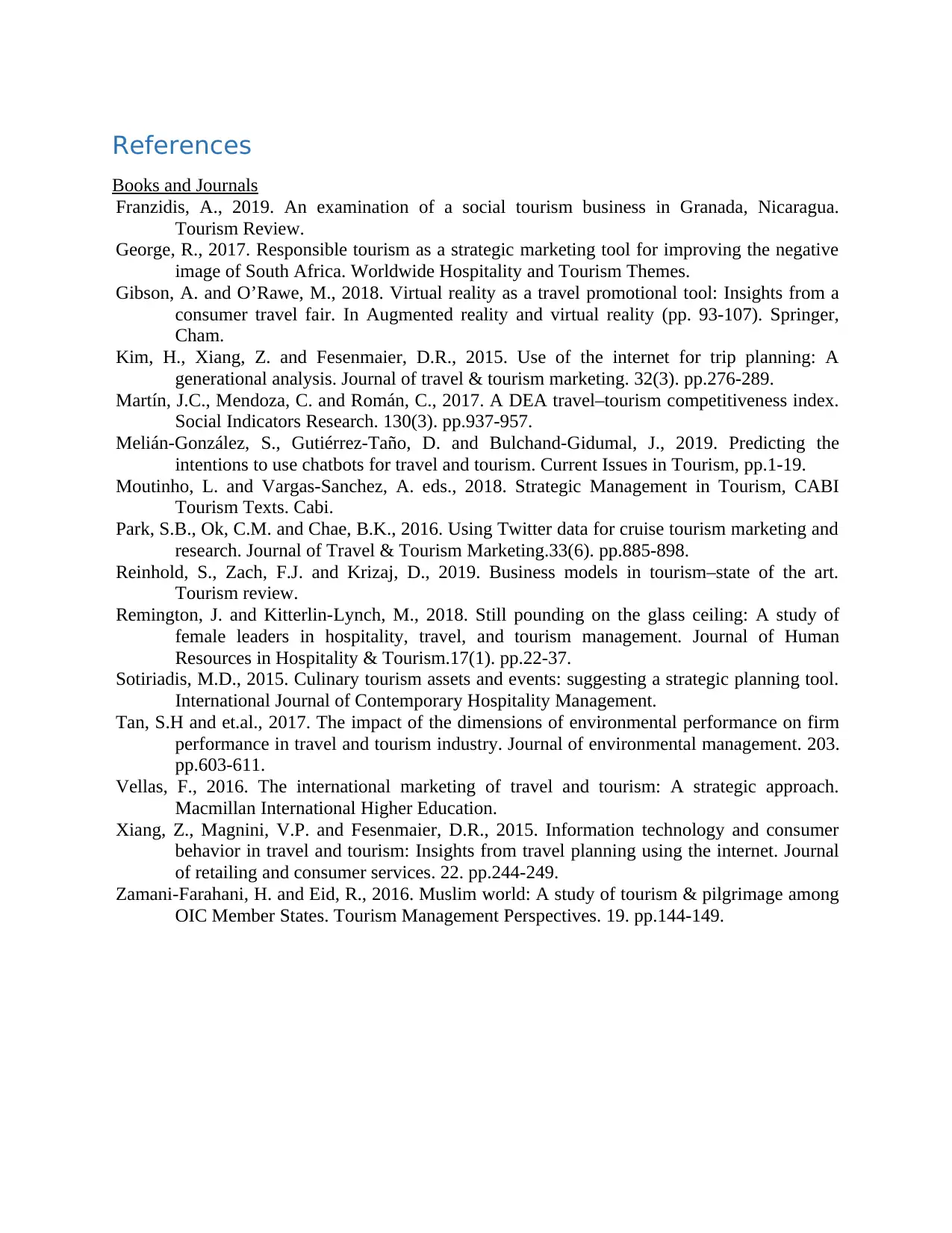
References
Books and Journals
Franzidis, A., 2019. An examination of a social tourism business in Granada, Nicaragua.
Tourism Review.
George, R., 2017. Responsible tourism as a strategic marketing tool for improving the negative
image of South Africa. Worldwide Hospitality and Tourism Themes.
Gibson, A. and O’Rawe, M., 2018. Virtual reality as a travel promotional tool: Insights from a
consumer travel fair. In Augmented reality and virtual reality (pp. 93-107). Springer,
Cham.
Kim, H., Xiang, Z. and Fesenmaier, D.R., 2015. Use of the internet for trip planning: A
generational analysis. Journal of travel & tourism marketing. 32(3). pp.276-289.
Martín, J.C., Mendoza, C. and Román, C., 2017. A DEA travel–tourism competitiveness index.
Social Indicators Research. 130(3). pp.937-957.
Melián-González, S., Gutiérrez-Taño, D. and Bulchand-Gidumal, J., 2019. Predicting the
intentions to use chatbots for travel and tourism. Current Issues in Tourism, pp.1-19.
Moutinho, L. and Vargas-Sanchez, A. eds., 2018. Strategic Management in Tourism, CABI
Tourism Texts. Cabi.
Park, S.B., Ok, C.M. and Chae, B.K., 2016. Using Twitter data for cruise tourism marketing and
research. Journal of Travel & Tourism Marketing.33(6). pp.885-898.
Reinhold, S., Zach, F.J. and Krizaj, D., 2019. Business models in tourism–state of the art.
Tourism review.
Remington, J. and Kitterlin-Lynch, M., 2018. Still pounding on the glass ceiling: A study of
female leaders in hospitality, travel, and tourism management. Journal of Human
Resources in Hospitality & Tourism.17(1). pp.22-37.
Sotiriadis, M.D., 2015. Culinary tourism assets and events: suggesting a strategic planning tool.
International Journal of Contemporary Hospitality Management.
Tan, S.H and et.al., 2017. The impact of the dimensions of environmental performance on firm
performance in travel and tourism industry. Journal of environmental management. 203.
pp.603-611.
Vellas, F., 2016. The international marketing of travel and tourism: A strategic approach.
Macmillan International Higher Education.
Xiang, Z., Magnini, V.P. and Fesenmaier, D.R., 2015. Information technology and consumer
behavior in travel and tourism: Insights from travel planning using the internet. Journal
of retailing and consumer services. 22. pp.244-249.
Zamani-Farahani, H. and Eid, R., 2016. Muslim world: A study of tourism & pilgrimage among
OIC Member States. Tourism Management Perspectives. 19. pp.144-149.
Books and Journals
Franzidis, A., 2019. An examination of a social tourism business in Granada, Nicaragua.
Tourism Review.
George, R., 2017. Responsible tourism as a strategic marketing tool for improving the negative
image of South Africa. Worldwide Hospitality and Tourism Themes.
Gibson, A. and O’Rawe, M., 2018. Virtual reality as a travel promotional tool: Insights from a
consumer travel fair. In Augmented reality and virtual reality (pp. 93-107). Springer,
Cham.
Kim, H., Xiang, Z. and Fesenmaier, D.R., 2015. Use of the internet for trip planning: A
generational analysis. Journal of travel & tourism marketing. 32(3). pp.276-289.
Martín, J.C., Mendoza, C. and Román, C., 2017. A DEA travel–tourism competitiveness index.
Social Indicators Research. 130(3). pp.937-957.
Melián-González, S., Gutiérrez-Taño, D. and Bulchand-Gidumal, J., 2019. Predicting the
intentions to use chatbots for travel and tourism. Current Issues in Tourism, pp.1-19.
Moutinho, L. and Vargas-Sanchez, A. eds., 2018. Strategic Management in Tourism, CABI
Tourism Texts. Cabi.
Park, S.B., Ok, C.M. and Chae, B.K., 2016. Using Twitter data for cruise tourism marketing and
research. Journal of Travel & Tourism Marketing.33(6). pp.885-898.
Reinhold, S., Zach, F.J. and Krizaj, D., 2019. Business models in tourism–state of the art.
Tourism review.
Remington, J. and Kitterlin-Lynch, M., 2018. Still pounding on the glass ceiling: A study of
female leaders in hospitality, travel, and tourism management. Journal of Human
Resources in Hospitality & Tourism.17(1). pp.22-37.
Sotiriadis, M.D., 2015. Culinary tourism assets and events: suggesting a strategic planning tool.
International Journal of Contemporary Hospitality Management.
Tan, S.H and et.al., 2017. The impact of the dimensions of environmental performance on firm
performance in travel and tourism industry. Journal of environmental management. 203.
pp.603-611.
Vellas, F., 2016. The international marketing of travel and tourism: A strategic approach.
Macmillan International Higher Education.
Xiang, Z., Magnini, V.P. and Fesenmaier, D.R., 2015. Information technology and consumer
behavior in travel and tourism: Insights from travel planning using the internet. Journal
of retailing and consumer services. 22. pp.244-249.
Zamani-Farahani, H. and Eid, R., 2016. Muslim world: A study of tourism & pilgrimage among
OIC Member States. Tourism Management Perspectives. 19. pp.144-149.
⊘ This is a preview!⊘
Do you want full access?
Subscribe today to unlock all pages.

Trusted by 1+ million students worldwide
1 out of 12
Related Documents
Your All-in-One AI-Powered Toolkit for Academic Success.
+13062052269
info@desklib.com
Available 24*7 on WhatsApp / Email
![[object Object]](/_next/static/media/star-bottom.7253800d.svg)
Unlock your academic potential
Copyright © 2020–2026 A2Z Services. All Rights Reserved. Developed and managed by ZUCOL.




